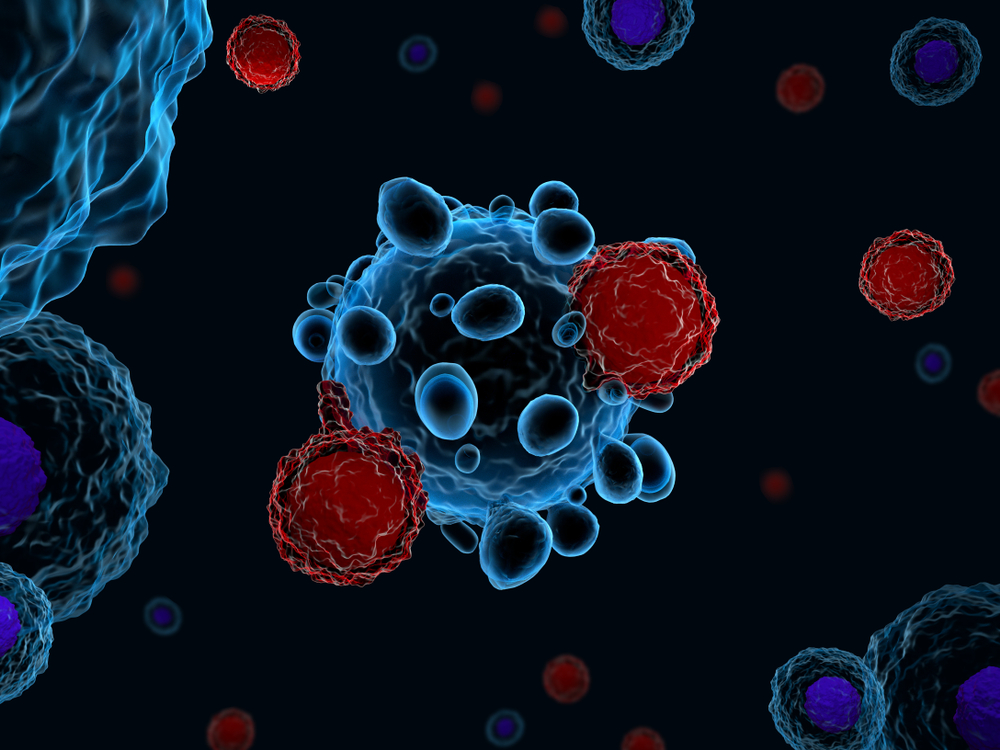AMG 420 Immunotherapy Effective in Difficult-to-treat Multiple Myeloma, Early Study Results Show

The investigational immunotherapy AMG 420 lessened tumor burden and led to cancer disappearing in half of the patients with relapsed or refractory multiple myeloma who received the most effective dose in a Phase 1 clinical trial.
The study, “Evaluation of AMG 420, an anti-BCMA bispecific T-cell engager (BiTE) immunotherapy, in R/R multiple myeloma (MM) patients: Updated results of a first-in-human (FIH) phase I dose escalation study,” was presented at the recent 2019 American Society of Clinical Oncology (ASCO) Annual Meeting and was selected for the Best of ASCO highlights.
AMG 420 uses Amgen’s bispecific T-cell engager (BiTE) technology, designed to bring together the patients’ immune T-cells and cancer cells, which boosts the T-cells’ ability to induce tumor cell death. Specifically, AMG 420 targets the BCMA protein in myeloma cells and the CD3 protein at the surface of T-cells.
The ongoing clinical trial (NCT02514239) aims to evaluate the safety, tolerability and anti-tumor activity of AMG 420 in 42 patients with relapsed or refractory multiple myeloma.
All had experienced disease progression after at least two prior lines of treatment, including a proteasome inhibitor — such as Velcade (bortezomib), Kyprolis (carfilzomib), or Ninlaro (ixazomib) — and an immunomodulatory imide therapy, such as Revlimid (lenalidomide) or Pomalyst (pomalidomide).
AMG 420 was given at doses ranging between 0.2 and 800 µg/day. The maximum tolerated dose was 400 µg/d.
As of the latest analysis, AMG 420 induced clinical responses in 13 of 42 patients (median age 65 years) across the different dose groups. Of the six patients achieving minimal residual disease-negative complete response (no signs of cancer), five were treated with the 400 µg/d dose. Also with this dose, one patient achieved a very good partial response, and another a partial response.
As seen earlier, the overall response rate — complete and partial responses — at 400 µg/day was 70% (seven in 10 patients). In turn, the median duration of response was nine months and the median time to response was one month, with 11 of 13 patients responding in the first six-week cycle.
Nineteen patients (45%) experienced serious adverse events (side effects). Sixteen required hospitalization and four prolonged hospitalization. No serious or life-threatening central nervous system toxicities were observed.
Treatment-related serious adverse events included damage in peripheral nerves (two patients) and swelling (one patient). One patient had a serious cytokine release syndrome, a form of systemic inflammatory response causing flu-like symptoms. Of note, two patients died for causes deemed unrelated to the therapy.
“These updated results … showed that AMG 420 at the 400 µg/d dose was efficacious with no new safety concerns in heavily pre-treated patients with relapsed and/or refractory multiple myeloma,” Max S. Topp, MD, a trial investigator, said in a press release. Topp is a professor at University Hospital of Wuerzburg, Germany. “Based on these results, we recommend AMG 420 at the 400 µg/d dose for further investigation.”
Also at the ASCO meeting, Amgen presented early results of a Phase 1 study (NCT01723475) of AMG 212 (pasotuxizumab) in patients with metastatic castration-resistant prostate cancer, who did not respond to standard therapy. AMG 212 is designed to target the prostate-specific membrane antigen, found at high levels in prostate cancers.
Among the main findings so far, three patients experienced prostate-specific antigen decreases of at least 50%. One of the two long-term responders showed a complete regression of soft-tissue metastases, marked regression of bone metastases, as well as durable lessening of disease-related symptoms.
“Our BiTE immuno-oncology platform offers unique versatility, with the potential to treat various tumors through targeting tumor-associated antigens,” said David M. Reese, MD, Amgen’s executive vice president of research and development. “These data at the ASCO Annual Meeting reinforce the potential of BiTE technology for patients with difficult-to-treat cancers like multiple myeloma and prostate cancer.”
Besides multiple myeloma and prostate cancer, Amgen is assessing the BiTE immuno-oncology platform across a vast range of solid and blood malignancies, including Phase 1 studies of AMG 596 in glioblastoma (NCT03296696), and of AMG 757 in small cell lung cancer (NCT03319940). Both of these studies are currently enrolling participants. (For detailed information, click on the NCT identifiers.)
Amgen held a webcast investor meeting at ASCO 2019, at which time it discussed its oncology program and results. The webcast can be accessed here.






